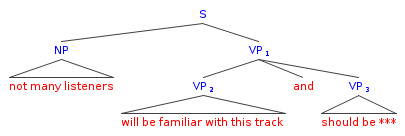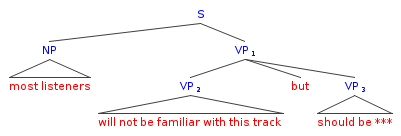"… and should be"
« previous post | next post »
From David Denison:
Not sure where this fits in the misnegation scheme of things. On Jazz Record Requests (BBC Radio 3, 19 Jan 17:00) the presenter quoted a listener's request as follows:
I think that not many listeners will be familiar with this track – and should be.
As David observes, "The intended meaning is obvious" — and the number of negatives is appropriate — but something has gone wrong. Two things combine to create the problem: (1) The placement of the negative (in the subject "not many listeners"); and (2) the syntactic level of the and coordination (partnered with the verb phrase "will be familiar"). In addition, the intended meaning is more consistent with but than with and.
If we ignore the initial qualifier "I think …", the structure looks something like this:

(I've used "***" to mark the verb phrase ellipsis "familiar with this track".)
This means that there are not many listeners for whom it's both true that they are familiar with this track and that they should be familiar with this track. And that, unfortunately, is more or less the opposite of what the presenter clearly meant, which is that (most or all) listeners ought to be familiar with the track, even though they mostly now are not.
The presenter could have fixed the problem by changing the level of coordination to sentences instead of verb phrases:

Or by putting the negation in the first conjoined verb phrase rather than in the subject:

Or both:

Other solutions are obviously possible as well.
This is the sort of thing that often goes wrong in extemporaneous speech, where we're somehow managing to cast complex hierarchies and conjunctions of concepts into word-sequences in real time. It's especially common when an additional thought is added to the ingredients list after the cake is partly baked, as seems to have happened here.
Not many of us are capable of getting it right all the time — nor should be.
djw said,
January 20, 2013 @ 11:17 am
I haven't documented anything, but I have sensed a growing ignorance of the use of "but" in the student papers I read as a university lecturer in writing. My students are mostly upperclassmen, and their SATs and GPAs suggest that they are quite bright, but I often find myself urging them to use "but" instead of "and" for stringing thoughts together. Glad to see it's not just the ones I'm teaching.
Matt McIrvin said,
January 20, 2013 @ 11:40 am
Maybe they're thinking in terms of Boolean logic, in which "but" (when used to connect clauses) would be nothing but a synonym for "and".
Dick Margulis said,
January 20, 2013 @ 2:43 pm
@Matt: Hmm . . . By your logic,
Maybe they're thinking in terms of Boolean logic, in which "but" (when used to connect clauses) would be nothing and a synonym for "and".
I don't think that actually works; "but" cannot be both nothing and a synonym for "and".
James said,
January 20, 2013 @ 2:46 pm
'But' denotes the same truth function as 'and', but(!) has an additional meaning, possibly a conventional implicature, to the effect that (roughly) the two conjuncts contrast, and usually (though perhaps not here) that they together produce a surprising, unexpected, or improbable combination.
James said,
January 20, 2013 @ 2:47 pm
DM: hah!
(Reminds me of the James Thurber essay on proper use of 'whom'.)
Zizoz said,
January 20, 2013 @ 6:50 pm
I actually initially read it as meaning "not many listeners will be familiar with this track – and that's as it should be". Perhaps if I had heard it I would not though; and certainly my version doesn't make sense in context.
dainichi said,
January 20, 2013 @ 8:43 pm
Interesting! If the 'and' is changed to a 'but', my mind just barely permits this (or at least understands it):
Not many listeners will be familiar with this track – but should be.
I think it's because it does a transformation on the part before the afterthought to something like
Many listeners will not be familiar with this track
and then when parsing the afterthought fills in ellipses thus:
(Many listeners) should be (familiar with this track)
I think one reason my mind prefers 'but' is that its contrast to 'not', i.e. "(Many listeners) will NOT be BUT should be (familiar with this track)" somehow helps reading the 'not' as modifying the 'will' and not the 'many'. This helps transform the subject of the first sentence into 'Many listeners', which works well as the subject of the afterthought.
The above syntactic analysis is nice, but I'd like to hear if anybody could provide either some quantifier analysis or some topic-focus analysis. It seems obvious to me that the
Not many listeners will be familiar with this track
is not saying something about "not many listeners". It's either saying something about "Many listeners", namely that they're not familiar with the track, or saying something about "Listeners familiar with the track", namely that they're not many.
R. Sabey said,
January 21, 2013 @ 8:50 am
@danichi "Not many listeners will be familiar with this track" is different from "Many listeners will be unfamiliar with this track". Jazz Record Requests might be one of the less popular BBC radio programmes, but let's acknowledge the possibility that there were many listeners that knew the track and many that didn't.
You say that what the presenter said 'is not saying something about "not many listeners"'. True, but then by the same token "Nobody is hurting me" is not saying anything about "nobody".
I analyse the error like this: for the sentence to express what the presenter meant, the negative must be restricted to the first conjunct, but it wasn't, so it didn't.
Mar Rojo said,
January 21, 2013 @ 9:02 am
Seems OK to me.
Mar Rojo said,
January 21, 2013 @ 9:04 am
Seems OK to me. I'd read it as having an ellipted "yet".
"I think that not many listeners will be familiar with this track – and should be."
Mar Rojo said,
January 21, 2013 @ 9:05 am
I'd read it as having an ellipted "yet".
"I think that not many listeners will be familiar with this track – and you should be."
Mar Rojo said,
January 21, 2013 @ 9:06 am
Seems OK to me. I'd read it as having an ellipted "yet".
"I think that not many listeners will be familiar with this track – and should be."
(Sorry for the previous error.)
Mar Rojo said,
January 21, 2013 @ 9:09 am
(Please delete previous posts of mine in this thread.)
Seems OK to me. I'd read it as having an ellipted "yet".
"I think that not many listeners will be familiar with this track – and (yet) should be."
Ted said,
January 22, 2013 @ 6:44 pm
I don't think you can eliminate the initial "I think" from the analysis.
I think the desired meaning is "I think that [not many listeners will be familiar with this track] and [they should be]."
As I see it, the speaker intends the elided "they" to refer back to "many listeners." Inconveniently, however, it turns out technically to refer to the grammatical subject of the phrase that is the object of the preposition that, which is "not many listeners" — the opposite of what was meant.